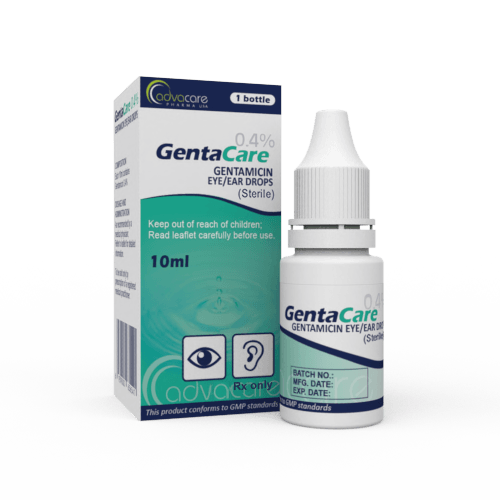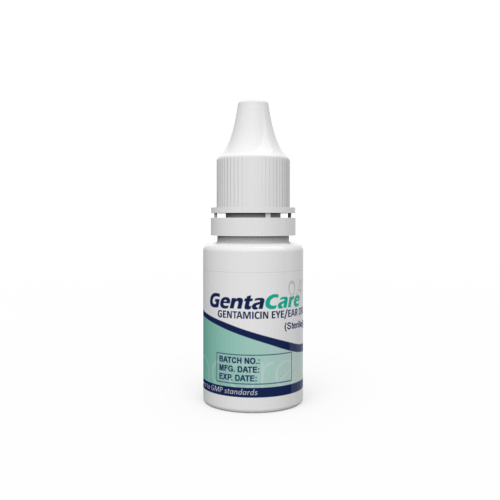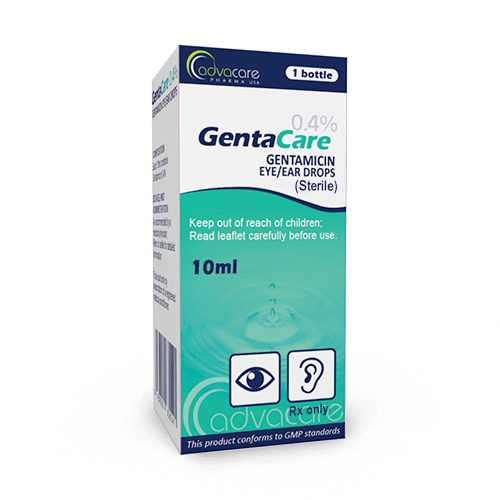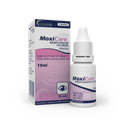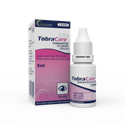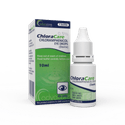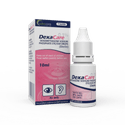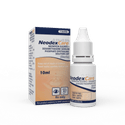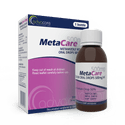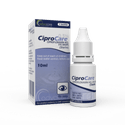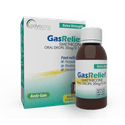- Home›
- Pharmaceuticals›
- Medical Eye Drops›
- Gentamicin Sulfate Eye Drops
Gentamicin Sulfate Eye Drops
Dosage
Packaging
What is Gentamicin Sulfate?
Active Ingredients: Gentamicin Sulfate
Gentamicin Eye Drops are an antibiotic drug used to treat bacterial infections in the eyes and ears. It is indicated for the treatment of ocular conditions such as conjunctivitis, keratitis, blepharitis, and corneal ulcers. This medicine may be used as prophylaxis against infection from surgery or after an injury.
Gentamicin solution for ophthalmic use is considered safe for use in adults and children over 1-month-old. This drug shows a broad range of activity against infections caused by many strains of microorganisms, including Staphylococcus aureus, Staphylococcus epidermidis, Streptococcus pyogenes, Streptococcus pneumoniae, Enterobacter aerogenes, Escherichia coli, Haemophilus influenzae, Klebsiella pneumoniae, Neisseria gonorrhoeae, Pseudomonas aeruginosa, and Serratia marcescens.
Gentamicin (gentamycin) is classified as an aminoglycoside antibiotic. This antibiotic has been derived from Micromonospora purpurea. It works by inhibiting protein synthesis within the bacteria.
This medication is a topical anti-infective agent which is intended for ophthalmic use. The solution is an aqueous liquid with added buffer, with a pH range of 6.5-7.5.
Gentamicin Eye Drops are available with a dosage of 0.3% or 0.4%. The sterile solution has been produced in a 10ml bottle.
AdvaCare Pharma also produces Gentamicin Eye Ointment and Gentamicin Injection.
AdvaCare Pharma is a trusted global exporter of Gentamicin Eye Drops. This medication is manufactured in our GMP-certified facilities in China, India, and the USA. Our production facilities are regularly inspected to ensure they comply with WHO's standards, rules, and regulations.
Why are we a trusted Gentamicin Sulfate Eye Drops manufacturer?
AdvaCare Pharma is a GMP-compliant manufacturer of Gentamicin Eye & Ear Drops. Over the past two decades, we have cultivated a strong reputation as a leading pharmaceutical supplier across 65 nations. As a reliable Gentamicin manufacturer, AdvaCare Pharma partners with pharmaceutical distributors, hospitals, pharmacies, NGOs, and government institutions to provide 30+ superior-quality eye and ear (ophthalmic/otic) medicines to global communities.
Uses
What is Gentamicin Sulfate used for?
It is used to treat susceptible bacterial infections of the eye, skin around the eyes, or ears, such as:
- conjunctivitis
- keratitis
- keratoconjunctivitis
- corneal ulcers
- blepharitis
- blepharoconjunctivitis
- acute meibomianitis
- episcleritis
- dacryocystitis
- otitis externa
Gentamicin may also be used to prevent infection during surgery or after injury or trauma.
How are Gentamicin Sulfate Eye Drops used?
This medication is manufactured as a sterile topical solution, which is intended for administration to the eyes or ears. This product is not intended for subconjunctival injection, nor should it be administered to the anterior chamber of the eye.
Always examine the solution before use and discard any bottle that has changed colors or has particulate matter in it.
When applying the eye drops, care should be taken to not touch the tip of the container to any surface, including the eye or eyelid. Always wash hands with soap and water before and after using this medication.
The eye drops should be used for the duration of the prescribed treatment, even if symptoms have subsided.
How can Gentamicin Sulfate Eye Drops be used in the ears?
When using this product to treat ear infections, the individual should lie down or tilt the head so that the ear is facing upwards. The earlobe should be gently pulled in order to straighten the ear canal, and then the prescribed amount of drops should be administered to the ear canal. It is recommended to keep the ear facing up for 1-2 minutes. It may be useful to insert a small piece of cotton into the ear in order to help prevent any leakage.
How should Gentamicin Sulfate Eye Drops be stored?
This medicine should be kept in its original bottle. After use, it should be tightly fastened and stored in a dry location at room temperature (20-25°C). It should be kept out of excessive heat and direct sunlight. The medication should be discarded after 28 days of opening.
What dose should be taken?
Adult Dosing Dosage may vary based on different medical indications:
- For bacterial conjunctivitis, the usual dose is 1-2 drops in each affected eye, given every 4 hours. For severe infections, 2 drops can be given per eye for every hour until improvement.
- For corneal ulcers, the usual dose is 1-2 drops in each affected eye, given every 4 hours. For severe infections, 2 drops can be given per eye for every hour until improvement.
- For keratitis, the usual dose is 1-2 drops in each affected eye, given every 4 hours. For severe infections, 2 drops can be given per eye for every hour until improvement.
- For keratoconjunctivitis, the usual dose is 1-2 drops in the affected eye(s), given every 4 hours. For severe infections, 2 drops can be given per eye for every hour until improvement.
- For blepharitis, the usual dose is 1-2 drops in each affected eye, given every 4 hours. For severe infections, 2 drops can be given per eye for every hour until improvement.
- For blepharoconjunctivitis, the usual dose is 1-2 drops in each affected eye, given every 4 hours. For severe infections, 2 drops can be given per eye for every hour until improvement.
- For blepharoconjunctivitis, the usual dose is 1-2 drops in each affected eye, given every 4 hours. For severe infections, 2 drops can be given per eye for every hour until improvement.
- For acute meibomianitis, the usual dose is 1-2 drops for each affected eye, given every 4 hours. For severe infections, 2 drops can be given per eye for every hour until improvement.
- For dacryocystitis, the usual dose is 1-2 drops for each affected eye, given every 4 hours. For severe infections, 2 drops can be given per eye for every hour until improvement.
- For postoperative prophylaxis, the usual dose is 1-2 drops in each eye, given every 4 hours.
- For ear infections, the usual dose is 3-4 drops in the affected ear, given 3 times a day.
Pediatric Dosing Recommended dosage for children may vary based on different medical conditions:
- For bacterial conjunctivitis, the usual dose is 1-2 drops in the affected eye(s), given every 4 hours. For severe infections, 2 drops can be given per eye for every hour until improvement.
- For corneal ulcers, the usual dose is 1-2 drops in the affected eye(s), given every 4 hours. For severe infections, 2 drops can be given per eye for every hour until improvement.
- For keratitis, the usual dose is 1-2 drops in each affected eye, given every 4 hours. For severe infections, 2 drops can be given per eye for every hour until improvement.
- For keratoconjunctivitis, the usual dose is 1-2 drops in the affected eye(s), given every 4 hours. For severe infections, 2 drops can be given per eye for every hour until improvement.
- For blepharitis, the usual dose is 1-2 drops in each affected eye, given every 4 hours. For severe infections, 2 drops can be given per eye for every hour until improvement.
- For blepharoconjunctivitis, the usual dose is 1-2 drops in each affected eye, given every 4 hours. For severe infections, 2 drops can be given per eye for every hour until improvement.
- For blepharoconjunctivitis, the usual dose is 1-2 drops in each affected eye, given every 4 hours. For severe infections, 2 drops can be given per eye for every hour until improvement.
- For acute meibomianitis, the usual dose is 1-2 drops for each affected eye, given every 4 hours. For severe infections, 2 drops can be given per eye for every hour until improvement.
- For dacryocystitis, the usual dose is 1-2 drops for each affected eye, given every 4 hours. For severe infections, 2 drops can be given per eye for every hour until improvement.
- For preoperative antimicrobial prophylaxis to likely susceptible pathogens, the usual dose is 1-2 drops in each eye, given 2 - 24 hours before the surgery. When determining treatment, the susceptibility of isolates should be considered.
- For ear infections, the usual dose is 3-4 drops in the affected ear, given 3 times a day.
Refer to a doctor or pharmacist for guidelines on the exact dosage.
Who can use Gentamicin Sulfate Eye Drops?
Gentamicin Eye Drops can be given to adults and children, but caution is advised for specific groups of patients.
Pregnant This medicine should only be used for pregnant women if the benefits outweigh the potential risks.
Breastfeeding Current studies suggest that this medication is associated with minimal risk to the infant. Gentamicin Eye Drops should only be used if the benefits outweigh the risks.
Children Gentamicin Eye Drops are considered safe for use in children over 1 month old. The safety and effectiveness of this medicine have not been established in neonates.
Side Effects
As with all pharmaceuticals, some unwanted effects can occur from the use of Gentamicin Eye Drops.
Common side effects include, but may not be limited to:
- mild stinging or irritation of the eyes
- transient blurred vision
Serious side effects may include:
- signs of an allergic reaction
- redness, itching, swelling, or new signs of infection
- changes in vision or hearing
- seizures
- numbness
- weak or shallow breathing
- hallucinations
For a comprehensive understanding of all potential side effects, consult a medical professional.
If any symptoms persist or worsen, or you notice any other symptoms, please call your doctor.
Precautions
Do NOT use Gentamicin Eye Drops if:
- You are allergic to gentamicin or any of the other ingredients.
- You have myasthenia gravis or a related condition.
- You have a viral or fungal eye infection.
Some drugs may interact with gentamicin. It is important to consult a healthcare professional before beginning treatment.
Blurred vision may occur after using these eye drops. Do not drive or use heavy machines until vision has cleared.
Contact lenses should not be worn while undergoing treatment for acute eye infections.
It should be noted that the prolonged use of topical antibiotics has been known to cause an overgrowth of nonsusceptible microorganisms, including fungi, and bacterial resistance to this drug may also develop.
References
Fortified Antibiotic Ointment in Bacterial Keratitis
This study focused on experiments to determine the effectiveness of antibiotic ointment in cases of Pseudomonas keratitis in rabbits. It included a comparison of gentamicin ointments, solution, and placebo, each given every 30 minutes.
The results indicated that there was no significant difference in the antimicrobial effectiveness between fortified gentamicin ointment and fortified gentamicin solution when applied at 30-minute treatment intervals.
The conclusion of this research is that gentamicin is efficient in treating keratitis.
Gentamicin 0.3%: Why the most common dosage?
Gentamicin 0.3% is widely used due to its potent antibacterial properties, providing supportive treatment for various eye and skin infections. This concentration ensures sufficient drug delivery to the infected area while minimizing systemic absorption and potential side effects.

You might be interested in...
Why AdvaCare Pharma?
As an industry leader, we are aware of our responsibility to provide affordable and sustainable solutions to improve healthcare worldwide.
